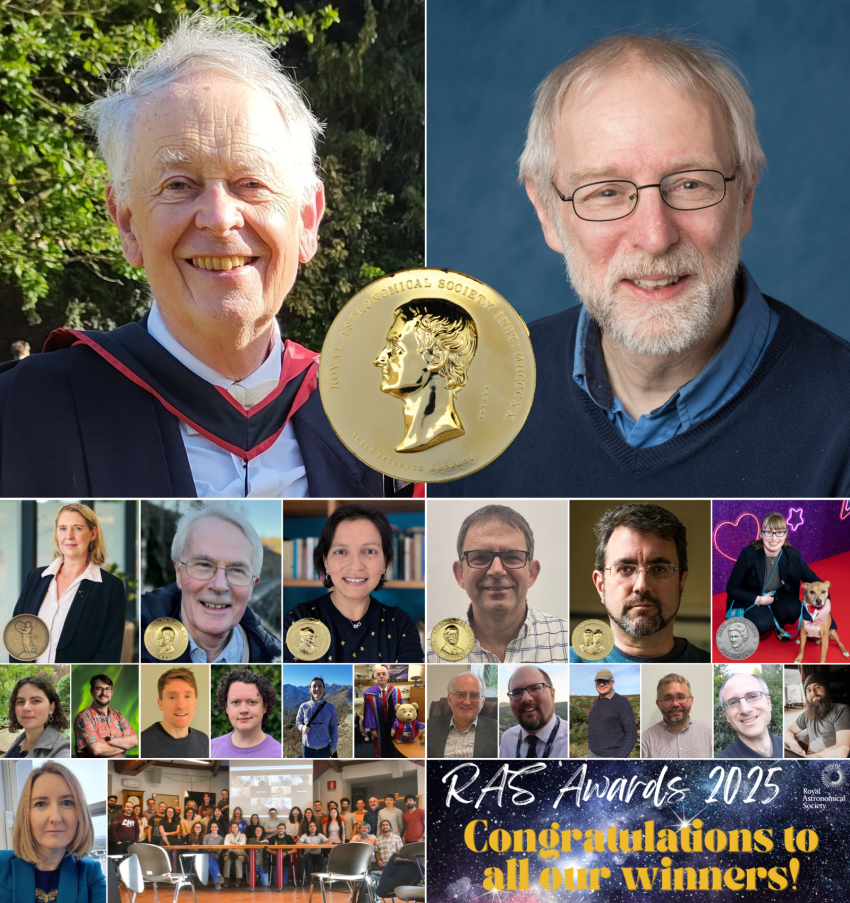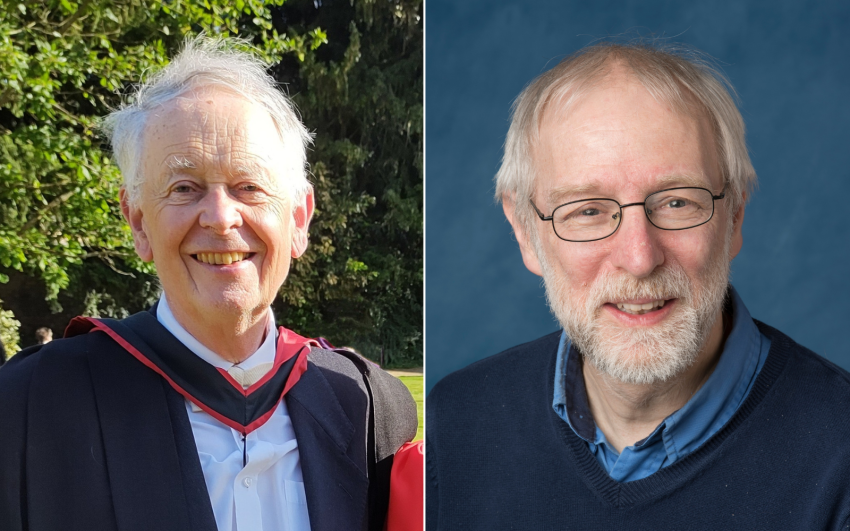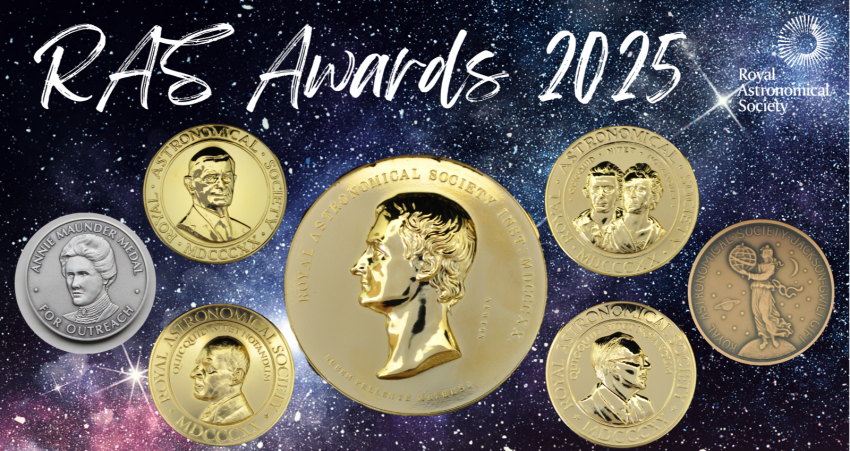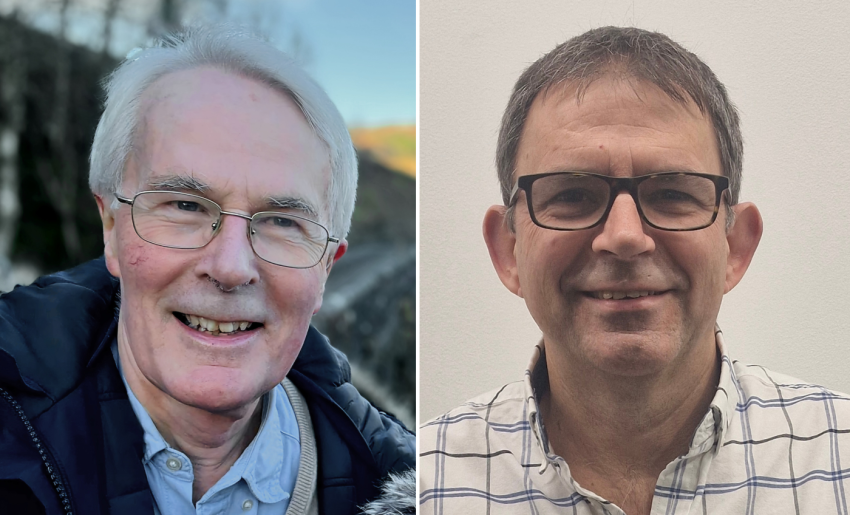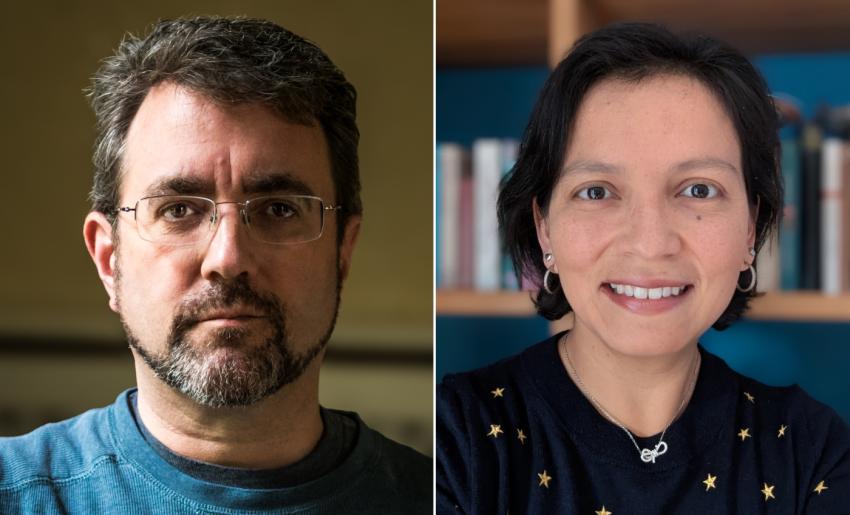One of the world's most distinguished theoretical astronomers and a pioneering molecular physicist who is illuminating our understanding of exoplanets have each been awarded the Royal Astronomical Society's illustrious Gold Medal for 2025.
Professor James Binney, of Oxford University, and University College London's Professor Jonathan Tennyson follow in the footsteps of Arthur Eddington, Albert Einstein, Edwin Hubble, Stephen Hawking and Jocelyn Bell Burnell in receiving the Society's highest honour, which dates back 200 years.
Each year the RAS recognises significant achievement in the fields of astronomy and geophysics through a number of awards, medals and prizes, encompassing different types of talent from research to education and outreach.
'Deeply honoured'
Professor Binney, who was awarded his prize in recognition of a lifetime of study of the structure and evolution of galaxies, said: "I'm delighted to be honoured by the RAS by the award of this year's Gold Medal.
"It was my great good fortune to be a theorist at a time of extraordinary progress in astronomy, mostly driven by spectacular advances in instrumentation.
"And most of what I've achieved has been in collaboration with generations of brilliant students and postdocs – this honour must be shared with them."
Professor Tennyson said he was "deeply honoured" to receive a Gold Medal from the RAS.
"This award is a recognition of the continuing importance of extensive and high quality laboratory data in supporting cutting edge astronomical research, and the important driver astronomy plays in the development of new methods in atomic and molecular physics," he added.
Trailblazing work
Professor Tennyson was honoured for a lifetime of ground-breaking research in molecular physics, as well as for his pioneering leadership of the ExoMol project, which aims to provide molecular line lists for exoplanets and other worlds with hot atmospheres.
These line lists are essential in the measurements and interpretations of measured spectra, and as a result, the ExoMol project is widely considered a standard method across the community. It has been fundamental to our understanding of the chemistry and dynamics of exoplanetary and solar system atmospheres.
Professor Tennyson's theoretical work on water molecules also led to the first detection of water in sunspots and proved that water could survive in stars as hot as our Sun.
He is on several editorial boards for scientific journals, including being the Editor-in-Chief of the RAS Journal of Techniques and Instruments, and is a Fellow of the Royal Society.
Professor Binney's research has significantly contributed to our understanding of elliptical galaxies, galaxy clusters and of the Milky Way.
He is also an exceptional pedagogue, whose textbooks have been deeply influential – most notably the classic graduate text he co-authored on "Galactic Dynamics".
Professor Binney's 1975 thesis derived fundamental characteristic sizes and masses of galaxies by considering the cooling of shock-heated proto-galactic gas. This work was hugely influential, and gas cooling remains one of the key ingredients in modern galaxy formation models.
He later contributed significantly to the work that generated the standard model for the mass distribution of the Milky Way. This is now being revised by the current flood of data from the Gaia observatory – and the RAS Gold Medal winner is highly active at the heart of these revolutionary developments, which continue to exploit the theoretical methods he developed.
Steeped in history
English mathematician Charles Babbage and German astronomer Johann Franz Encke were jointly handed the first RAS Gold Medal just over 200 years ago, in 1824.
Since 1964 two have been awarded each year: one for astronomy, and one for geophysics. The medal features an image of the 40-foot telescope constructed by Sir William Herschel, who was the first president of the RAS.
The award announcements were made at the A&G Highlights Meeting held on Friday 10 January 2025.
As well as the Gold Medals, the Royal Astronomical Society also awards a variety of other medals, awards, honorary fellowships and lectureships.
What the winners had to say
The 2025 Eddington Medal, which recognises investigations of outstanding merit in theoretical astrophysics, has been awarded to Douglas Heggie, Emeritus Professor at the University of Edinburgh.
"Being deep into retirement, it never occurred to me that something like this could happen," he said. "I'm surprised, delighted and extremely grateful to all concerned."
Dr Nigel Meredith, of the British Antarctic Survey, received the Chapman Medal, which is awarded for investigations of outstanding merit in the science of the Sun, space and planetary environments or solar-terrestrial physics.
He said he was "delighted and deeply honoured to receive this prestigious award from the Royal Astronomical Society", adding: "The research and outreach on which this award is based is the result of many successful collaborations with colleagues and friends from around the globe. I'd like to take this opportunity to thank each and every one and, in particular, my nominators for putting me forward for this medal."
The 2025 Herschel Medal, awarded for investigations of outstanding merit in observational astrophysics, was given to Ian Smail, Emeritus Professor at Durham University. He said: "I am delighted to accept the Royal Astronomical Society's Herschel Medal in recognition of the impact of the research I have undertaken with my collaborators over the past 30 years."
Dr Paola Pinilla, of University College London, received the Price Medal – awarded for single investigations or a series of closely-linked investigations of outstanding merit into the formation and composition of the Earth and/or planets.
She said: "It is a great honour to receive the Price Medal in recognition of my research on planet formation. I am deeply grateful to the collaborative community I work with for their support and the opportunities I have been given throughout my career. I also sincerely thank my nominators and referees for their trust and confidence in me."
The 2025 Jackson-Gwilt Medal, recognising outstanding invention, improvement, or development of astronomical or geophysical instrumentation or techniques, was awarded to Professor Anna Moore, of the Australian National University, while Professor Caitriona Jackman, of the DIAS Dunsink Observatory, received an Honorary Fellowship from the RAS.
Professor Moore said: "I am absolutely delighted to be the recipient of the 2025 Jackson-Gwilt medal. It’s an honour to join this long list of awardees dating back to 1897."
Amelia Jane Piper, who founded the charitable non-profit organisation MajorTim.space in 2016 aged 14, received the Annie Maunder Medal – awarded for an outstanding contribution to outreach and public engagement for astronomy or geophysics.
She said she was "truly honoured to be chosen for this prestigious award", adding: "I would like to say thank you for all the support I have received over the years, particularly from the MajorTim.space patrons, Dallas Campbell, Fred Haise, Poppy Northcutt, Jim Worden, Steve Sherman, Janet Ivey and Jim Adams.
"Our first patron, Apollo 15 astronaut Al Worden (who sadly passed away in 2020), was always keen to support the organisation."
Awards are designated 'A' for astronomy (including astrophysics and cosmology) and 'G' for geophysics (including solar physics, planetary science and solar-terrestrial physics). Full citations are linked as PDF files in the list below.
The full list of 2025 winners:
Gold Medal (A): Professor James Binney, Oxford University
Gold Medal (G): Professor Jonathan Tennyson, University College London
Eddington Medal (A): Emeritus Professor Douglas Heggie, University of Edinburgh
Chapman Medal (G): Dr Nigel Meredith, British Antarctic Survey
Herschel Medal (A): Emeritus Professor Ian Smail, Durham University
Price Medal (G): Dr Paola Pinilla, University College London
Jackson-Gwilt Medal (A): Professor Anna Moore, Australian National University
Fowler Award (A): Dr Hannah Wakeford, University of Bristol
Fowler Award (G): Dr John Coxon, Northumbria University
Early Career Award (A): Dr Steve Cunnington, University of Manchester, and Dr Niall Jeffrey, University College London
Early Career Award (G): Dr Giulia Magnarini, Natural History Museum, London
Group Achievement Award (A): European Pulsar Timing Array
Group Achievement Award (G): Met Office Space Weather Research Team
Service Award (A): Professor Francis Keenan, Queen's University Belfast
Service Award (G): Dr Dmitry Storchak, International Seismological Centre
Secondary Education Award: Dr Alex Calverley, Surbiton High School
Higher Education Award: Professor Andrew Norton, The Open University
Annie Maunder Medal: Amelia Jane Piper
'Named' lectures to be delivered at a meeting of the Society:
George Darwin Lectureship: Dr Dimitri Veras, University of Warwick
James Dungey Lectureship: Dr Ryan Milligan, Queen's University Belfast
Harold Jeffreys Lectureship: Dr Andrew Valentine, Durham University
Honorary Fellowship:
Professor Caitriona Jackman, DIAS Dunsink Observatory
Professor Mike Lockwood, president of the Royal Astronomical Society and former Gold Medal winner, said: "Awards are a very important part of the Society's function: the senior awards recognise a lifetime in science and great discoveries and the junior awards help build careers.
"It gives me great pleasure to see so many talented individuals being rewarded for their hard work, dedication and immense contributions to the fields of astronomy and geophysics.
"All our award winners are an inspiration and it is clear to me that the depth of talent means that the future of our sciences is incredibly bright.
"I very much look forward to awarding the winners their medals and prizes at this year's National Astronomy Meeting in Durham in July, when we will celebrate their great achievements."
ENDS
Media contacts
Sam Tonkin
Royal Astronomical Society
Mob: +44 (0)7802 877700
Robert Massey
Royal Astronomical Society
Mob: +44 (0)7802 877699
Images and captions
Images of the award winners and medals are available on request.
Notes for editors
The Royal Astronomical Society (RAS), founded in 1820, encourages and promotes the study of astronomy, solar-system science, geophysics and closely related branches of science. The RAS organises scientific meetings, publishes international research and review journals, recognises outstanding achievements by the award of medals and prizes, maintains an extensive library, supports education through grants and outreach activities and represents UK astronomy nationally and internationally. Its more than 4,000 members (Fellows), a third based overseas, include scientific researchers in universities, observatories and laboratories as well as historians of astronomy and others.The RAS accepts papers for its journals based on the principle of peer review, in which fellow experts on the editorial boards accept the paper as worth considering. The Society issues press releases based on a similar principle, but the organisations and scientists concerned have overall responsibility for their content.
Keep up with the RAS on X, Facebook, Instagram, LinkedIn, Bluesky and YouTube.
Download the RAS Supermassive podcast


